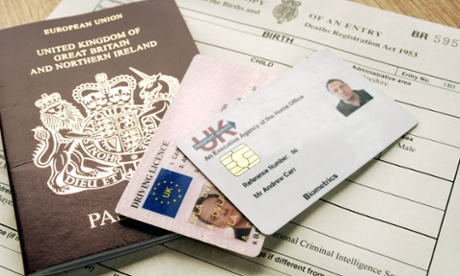It is billed as the biggest transformation for current account customers in years. From Monday, Britain's banks are guaranteeing that anyone wanting to move to a rival bank will be able to do so in just seven days, compared to the month-long hassle it can be now.
Seven-day switching is designed to loosen the grip that the "big four" high street banks have on 80m current accounts. Customers will simply have to fill in a form; the bank you're switching to does the rest.
All existing payment arrangements – such as direct debits and standing orders – along with regular payments coming in – salary/pension etc – will be transferred automatically from the old account to the new one.
For the first time the switching service will be backed by a "current account switch guarantee" which promises that you will be fully refunded and won't lose out if the switching system fails in any way. In addition, there will be a central redirection service to make sure that any payments sent to the old account after the switch date will be redirected automatically to the new account for a period of 13 months.
Last year, about 2 million people switched accounts, but the Payments Council expects many more to do so under the new rules. Customers don't even have to enter their local branch, as they may be able to make the switch entirely online if they wish.
Even customers who regularly go overdrawn will be allowed to switch, although the banks will credit score all applicants, and any switch will rely on the accepting bank agreeing to the same, or better, overdraft facilities, which is in no way guaranteed.
Best accounts if you stay in credit
The worst current accounts pay nothing in interest, while the best pay up to 5%, which beats the rates on the best cash Isas, so it's worth switching. But as usual they are all peppered with special terms and conditions, with all of them capping the amount of money on which they will pay the high interest rate.
Any money kept in your account above that level will receive little or no interest, so you have to play this carefully.
Broadly speaking, the Santander 123 account is best for large sums of money, while the Halifax Reward account is better for those with less in their accounts.
Santander 123 This is great if you are lucky enough to have £20,000 you can keep in your current account. Santander pays 1% interest on balances from £1,000-£2,000; on balances between £2,000 and £3,000 it pays 2%; then on balances from £3,000-£20,000 it pays 3%.
Given that the best instant-access cash Isa pays only 2% interest (from Tesco and Nationwide), the Santander deal is very attractive. Over a year, the account will pay interest of £592 gross on a £20,000 balance.
It also offers various "cashback" incentives when you spend money using the account. Customers get 1% cashback on water, council tax bills and mortgage payments with Santander, 2% cashback on gas and electricity bills, and 3% on mobile phone, home phone, broadband and paid-for TV packages.
Around 600,000 people signed up for the 123 account in the first half of this year, but there is a sting in the tail: this is not a free account – customers must pay a monthly fee of £2. They also have to commit to paying at least £500 a month into the account and set up at least two direct debits.
But you can hold two 123 accounts if you want to max out on the interest on offer.
Halifax Reward With this you don't receive a percentage interest rate on the cash in your current account, but instead you get a flat rate of £5 a month, so long as you pay in at least £750 a month, have a minimum of two direct debits on the account and remain in credit.
This makes it best for people who don't have much money to leave in the account, but have a monthly salary in excess of £750 and don't go overdrawn. You also receive £100 for switching.
The £5 is net of income tax, which means that if you are a higher rate taxpayer you may have to pay extra income tax on the reward payment. (You also, of course, have to pay tax on the Santander account at your marginal tax rate.)
Lloyds Vantage/TSB Enhance Yes, these banks have split, but for now these accounts are identical. They pay 1.5% on balances up to £1,000, 2% if you keep up to £3,000, and 3% if you maintain a balance of £3,000-£5,000. Above that the rate drops to zero.
Rates apply to your whole balance, eg, on £4,000 you are paid 3% on the lot. The drawback is that you have to pay at least £1,000 a month into the account and stay in credit. However, you can have up to three Vantage accounts.
Nationwide FlexDirect This pays the best interest rate of any current account at 5%, but only on balances up to £2,500 fixed for the first 12 months, and you have to pay in at least £1,000 a month. The rate drops to 1% after 12 months.
Best account if you go overdrawn
If you spend a lot of time in the red, you obviously need an account that offers cheap overdraft facilities. Even if you spend most of the month in credit, but tend to dip into the red as you near pay day, it is best to opt for accounts offering the cheapest overdrafts. Most banks allow just a small "buffer" overdraft of around £10-£25 for free, then pile on the fees; Lloyds charges 19.9% plus £10 a day for an unplanned overdraft.
Citibank Plus Current This account is best if you earn a decent salary but still go overdrawn at the end of the month. So long as you credit the account with a minimum of £1,800 a month and have a minimum of two direct debits set up against the account, you are allowed to go £500 overdrawn any time without paying fees or interest. Go beyond that, though, and the charge is 16.9%.
If your monthly income is lower (down to £1,250 a month) you can still get a free overdraft, but you have to pay £8 a month for the account.
First Direct 1st Account The first £250 overdraft is interest and fee free, but after that the rate is 15.9%. You must pay in at least £1,000 a month to qualify for this account.
Nationwide FlexAccount The chief advantage of this account is that for the first three months your pre-arranged overdraft is interest and fee free, although after that you have to pay interest at 18.9%. You also get free European multi-trip travel insurance. You must also pay in at least £750 a month.
The Co-operative Bank If your income is low and erratic, the Co-op current account is about best value. The overdraft rate is 18.9%, but unlike other accounts you do not have to pay in a minimum amount each month to qualify.
Post Office This is only on trial in East Anglia at the moment, but is one to look out for. It has a simple overdraft structure with a competitive overdraft interest rate. "Many current accounts have a raft of different overdraft fees and charges, whereas the Post Office has chosen to launch a refreshingly simple charging structure, with authorised overdrafts costing 14.9%," says David Black at research company Consumer Intelligence. There are no extra unauthorised overdraft charges. In fact, the only other fee of note is £15 for bounced payments.
Best for ethical banking
After all the bank scandals and bailouts, many people would like a more ethical home for their current account cash. But there aren't many options.
The Co-operative Bank The Co-op is the only ethical bank offering a current account with a well-established policy covering issues such as human rights and the arms trade, although Triodos Bank was recently reported to be considering entering the market. The Co-op Bank's Current Account Plus offers a fee-free £200 overdraft and a linked instant access savings account, but you must pay in at least £800 a month and it doesn't pay any in-credit interest. There is also a standard current account without the £800 a month funding requirement.
However, the bank's well-publicised troubles will make some people nervous. Last month it reported a £709m loss and raised the prospect of a Northern Rock-style rescue if a £1.5bn restructuring bid wasn't backed. Whatever happens, it looks set to shrink.
Building societies These are mutual, which means they are owned by their members and tend to have a strong regional identity and be tied to their local communities. In terms of their lending policy they are not "ethical", but many members are comforted by the fact they are not beholden to the stock market, and members can vote on key issues.
Nationwide is the biggest and offers two no-monthly-fee current accounts. Sadly, few other societies are able to offer full-service bank accounts, but the Coventry, Norwich & Peterborough, and the Cumberland all do. The Cumberland's current accounts are only open to people living locally.
The Post Office is trialing three current accounts at selected branches in East Anglia. Many people would argue that post offices are ethical to some degree, in that they are very much at the heart of local communities. The accounts will also help generate more income for sub-postmasters.
Meanwhile, quite a long list of credit unions now offer current accounts, including Bristol, Leeds City, London Mutual, London Community, Manchester, Norfolk, North Wales, Nottingham, Hampshire, Hull & East Yorkshire, 1st Class, Clockwise, Grampian, Lewisham Plus, Voyager Alliance, White Rose and 1st Alliance (Ayrshire).
Most carry a weekly fee of between 75p and £1.50 to cover running costs. Credit unions are not-for-profit co-operatives owned and controlled by their members.
Best accounts for regular travellers
If you make regular trips overseas, look out for a current account which charges zero or minimal add-on commission when you use your debit card abroad to make purchases, pay bills or withdraw money. Most banks typically charge 2%-3% on foreign transactions on top of the currency exchange rate, so ones without this fee save travellers a lot of cash.
However, it is rarely worth switching current account just for the overseas benefits. It is probably better to take out a low-cost card for overseas spending, such as the Halifax Clarity card.
Metro Bank This relatively new bank, with branches only in the London area, has no add-on charges for foreign transactions (purchases or withdrawing cash from ATMs) made on the debit card that comes with the account. You do, however, have to open the account in person at one of its branches.
Norwich & Peterborough Gold Classic Current Gold Classic Current This current account has no add-on commission charges on foreign transactions, but you must pay in at least £500 a month to qualify for it.
Nationwide FlexAccount Nationwide used to be the number one account for travellers, but has downgraded many of its benefits over the years. It still has no add-on commission charges on purchases abroad, although it does charge 2% plus a £1 fee on foreign cash transactions.
To qualify for this account you are required to pay in at least £750 a month.
Freebies for switching
Only two banks, so far, will offer direct bribes to encourage you to defect, although as seven-day switching begins on Monday, more may appear. Apart from direct payments, banks also offer cashback deals as an incentive to move your money.
First Direct 1st Account Pays £125 if you switch (provided you have not previously held any account with First Direct) and you transfer at least £1,000 a month to your account within three months of opening. It pays £100 more if, six months later, you are not happy and want to switch to another provider.
Halifax It is offering £100 to new and existing customers who hold an active bank account elsewhere if they switch to one of its current accounts. To qualify, you must use its switching service to transfer and close your old account. It has also launched Cashback Extras giving cashback of between 5% and 15% on purchases with certain retailers when account holders use a Halifax debit or credit card. If customers stick with their current spending habits, the bank estimates they will earn £100-plus cashback over 12 months.
Santander 123 Although this comes with a £2 monthly fee, it also pays cashback on household bills if the account is in credit between £1,000 and £20,000: 1% on water, council tax and Santander direct debits; 2% on electricity and gas; and 3% on mobile, home phone, broadband and paid-for TV packages.












